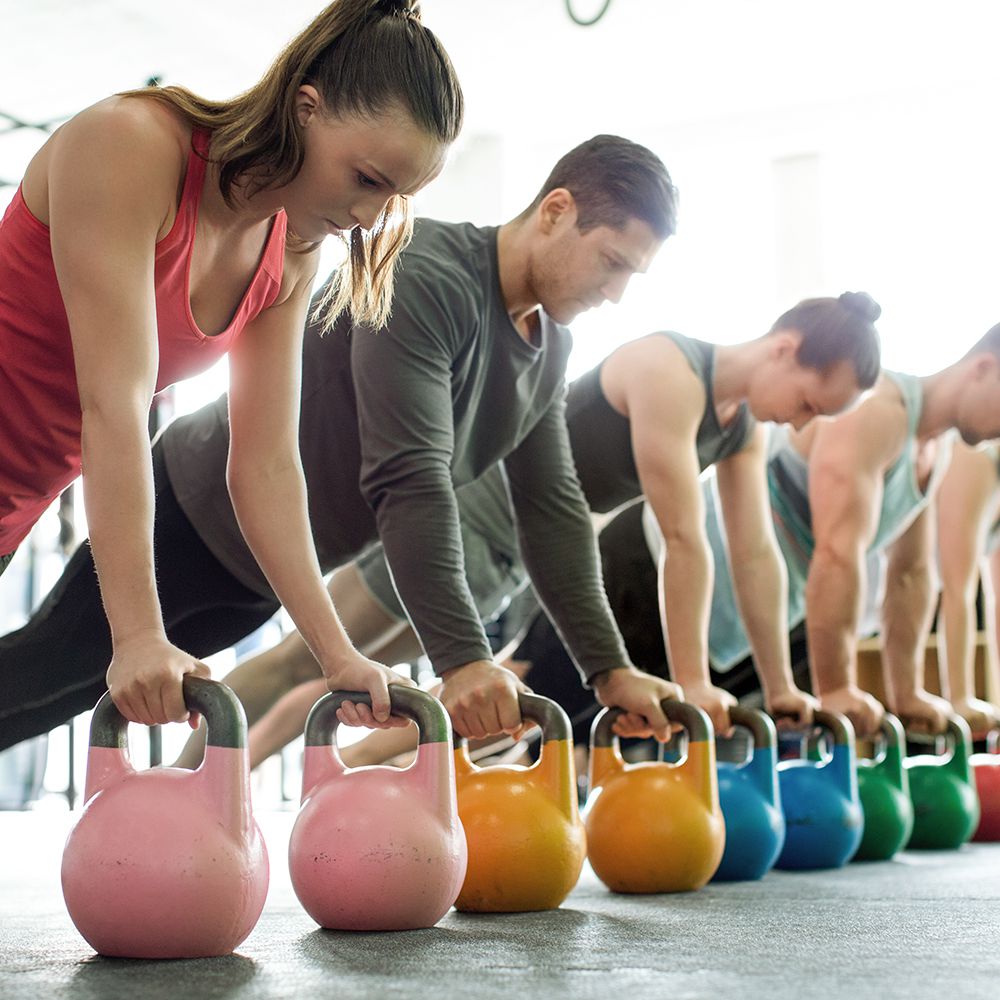
Many people love the high energy of Zumba. Others crave the intensity of a Spinning class in a dark room with the music blaring. But for some, well, they don’t enjoy any of it-Dance cardio? Nah. Spinning on a bike for an hour? No way. HIIT in a room full of ripped bodies? Ha! If you’re one of those people, you’re not alone. But what is it about group fitness classes that can make you feel uncomfortable, on edge, or maybe even bored?
First, the obvious: "People who are extroverts tend to prefer exercising in group environments," says Heather Hausenblas, Ph.D., professor of kinesiology at Jacksonville University in Florida. On the other hand, the opposite seems to be true of introverts, who would rather exercise in the comfort of their own home.
While not mutually exclusive to being outgoing or more reserved, confidence and body image can often play into your feelings about group classes as well. Hausenblas notes that people who are unhappy with their bodies may find that the group environment increases their anxiety, pointing out that even fitness instructors, who you assume will be fit and trim, can be intimidating to students. So, no, it's not just the girl with the six-pack in the sports bra.
So while it’s obvious what these negative thoughts can do to your self-esteem-nothing good, girl-forcing yourself to take these classes because they’re trendy, or because you think you’re supposed to be working out this way, is not just messing with your head. It’s messing with your workout results as well. (Not to mention if you go too hard in class you could actually hurt yourself. See: 3 Ways to Avoid Getting Hurt In Group Fitness Classes.)
Find yourself hiding in the back of the room? You bet that can hurt your workout. Hausenblas says that participating in these classes when you're not excited or confident can cause a decrease in your motivation. If you look at motivation as intensity, then a lack of motivation means you're less likely to really work hard and give the class all you've got. "In other words, they are really looking forward to the class being over," she says.
Research regarding exercise and motivation has found that although your fellow classmates do motivate you to work harder, it doesn’t necessarily mean you’re happier. Authors of a paper published in Perspectives on Psychological Science reported that “people tend to compare themselves with others who are most similar to them,” which increases competitive behavior, and even sparks rivalry. (So is competition legit workout motivation?) But what happens if you consistently feel like the odds are stacked against you either because you feel like you’re losing the competition (you can’t box jump that high or reach the top of the leaderboard) or there are too many “similar” athletes in the room (look at all those women doing so much “better” in class)? This research suggests that you’ll perceive the task at hand (whatever workout class you’re taking) as being less relevant (a lost cause) and lose interest (work less hard).
With all that said, if you really want to enjoy group fitness classes and get the most of out them, you can change how you feel. It all comes down to perception. Hausenblas says that many people have the mindset that everyone else in the room is watching you, when in reality, that isn't the case at all. Cate Gutter, NASM-certified personal trainer, has taught group aerobic classes such as Zumba, as well as one-on-one training sessions, and so she has seen the energy in the room firsthand. She puts any self-doubts to rest, saying, "Most people are focused on how they are personally doing and watching the instructor. If you do feel someone peering over at you, it's probably because you look great and they are trying to mimic your form."
Taking a deeper look at why you're working out in the first place can also be helpful to increase your motivation and therefore your results, whether it's in a group class, working out alone at the gym, or getting sweaty at home.
One 2002 study published in the Journal of Sport Behavior found that women in dance aerobic classes who focused on developing their own skills-meaning their objective was to be a better version of themselves, not the best in the class or better than the person next to them-were more engaged in the workout. They enjoyed class more than if they were too busy comparing themselves to everyone else in the room.
It's this kind of intrinsic motivation that allows you to have fun, work hard, and see results whether you're in a room filled with 20 models and athletes or on a yoga mat in your living room.
One more very important thing to remember: You don’t have to like group fitness classes. We know, shocking. If you’ve tried changing your attitude and your internal voice and motivators, and you still don’t enjoy group classes, then don’t force it. There are so many other ways to work out. Gutter says that despite the soaring popularity of group fitness classes (and the potential to motivate through competition), she believes that “greater results are achieved much faster and more significantly through personal training.” She credits this to having someone who can not only customize workouts for you but also hold you accountable for showing up and progressing to reach your goals. If personal training isn’t doable for you ($$$), Gutter notes that you can get the same effects-get in the zone and focus on nothing but yourself, your form, and your progress-from solo exercising as well. “I love the excitement and camaraderie of group exercise classes, but I also know that for my personal goals, I need to spend time in the gym working on my customized fitness plan,” she says, and you should do the same. (Discover seven tricks to push yourself when you’re exercising alone.)
When it comes down to it, there is not a "one exercise fits all" formula. Most people find that they're happiest when they're doing what they enjoy. So, go ahead and try all 20 fitness classes at your gym, or never go back to one again-just get moving!














































